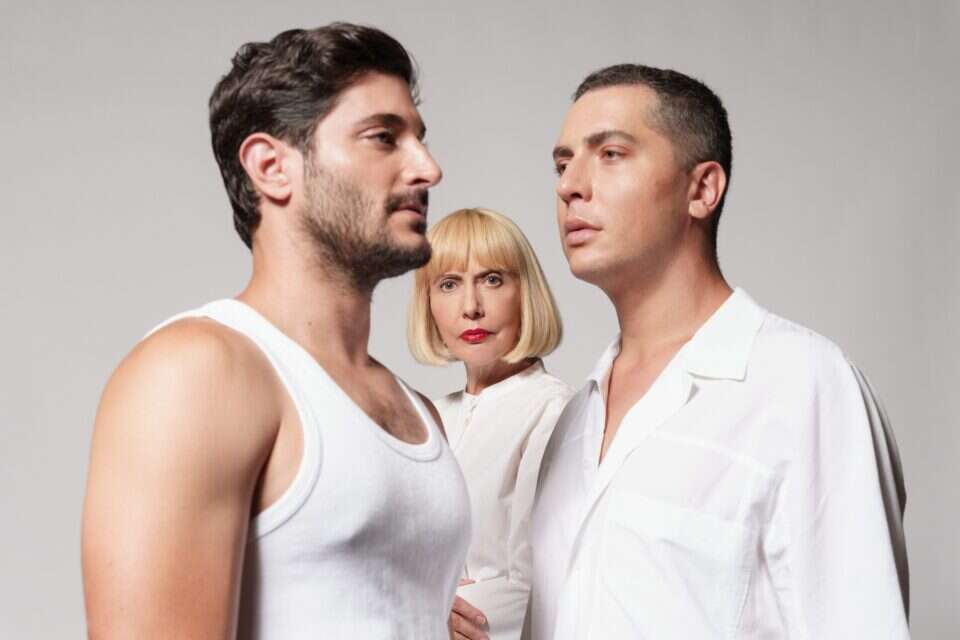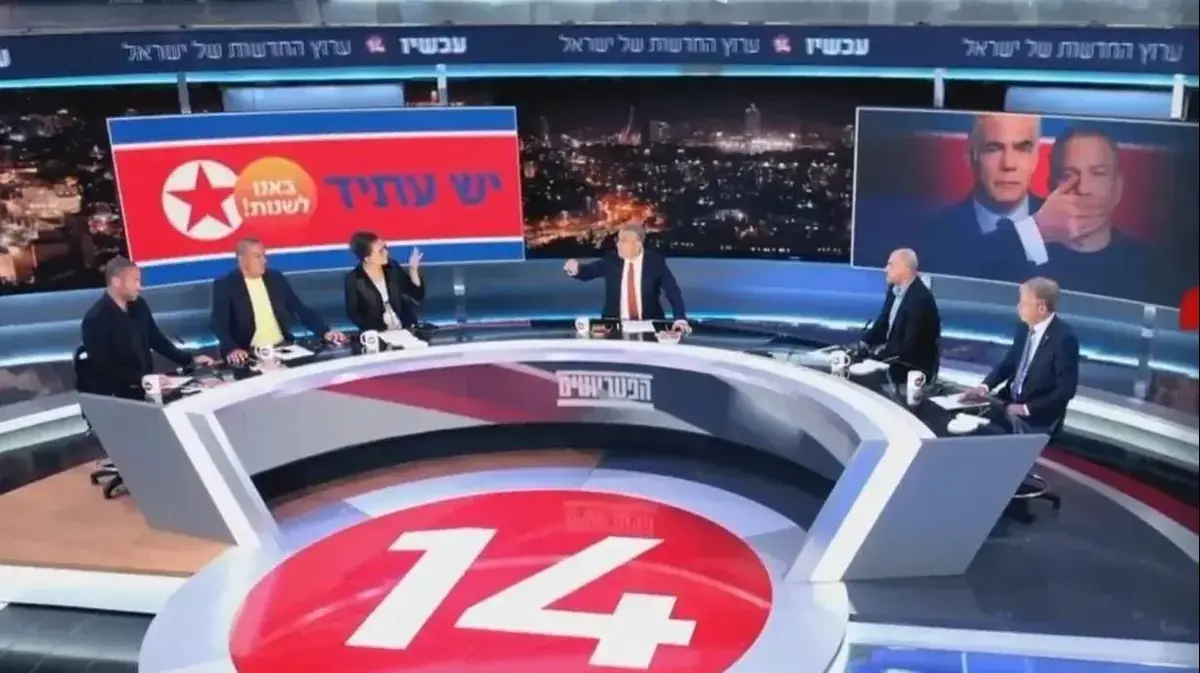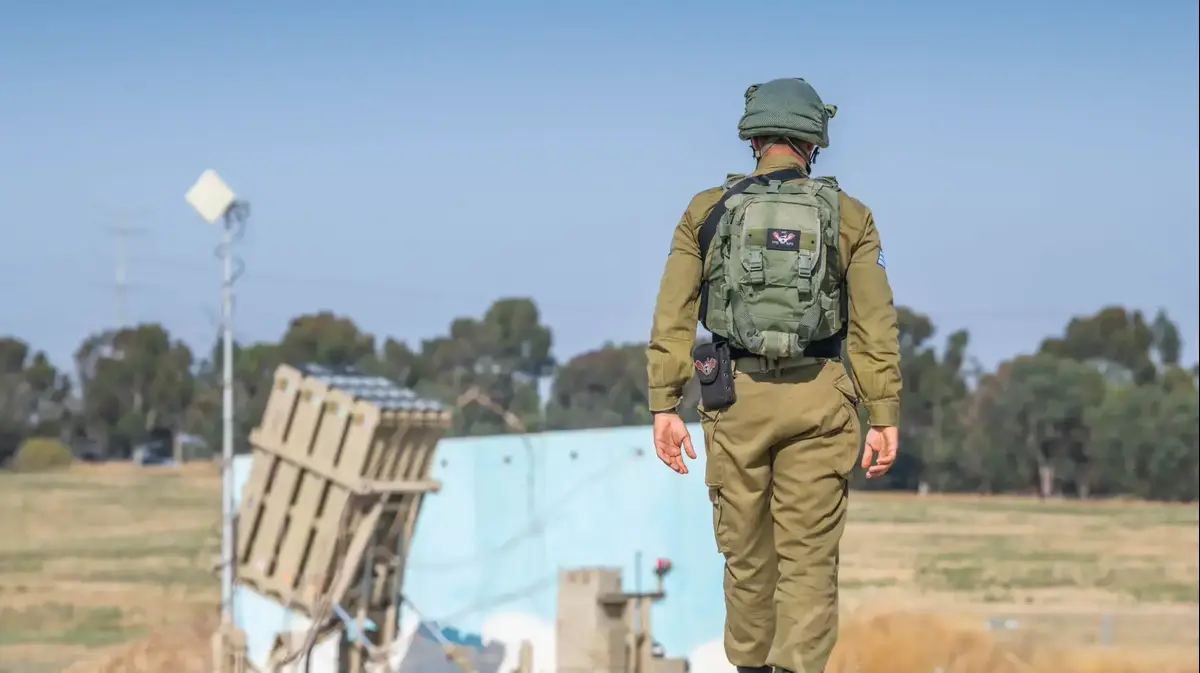Roy and Daniel are a couple of men from New York, a successful writer and architect who have been living together for 7 years, and as Sarah Nuno says, "Living the Dream".
The big obstacle at the center of their relationship is the fact that Daniel dreams of a ring, and Roy is really against the wedding.
This conflict is at the core of the play "Daniel Baali" - an American original production written by Michael McIver and translated into Hebrew by Yaron Fried, and staged as a production of the "Triangle" theater, founded by the gay center in Tel Aviv, in collaboration with Bhima 4 and directed by Rom Reznik.
The gap between Roy and Daniel's conflicting desires has devastating results as their lives are turned upside down.
The fact that the firm and strong partnership between them is not anchored in law causes them irreparable damage.
Alongside the actors Gilat Ankuri, Lior Zohar and Iti Uri, the couple are played by Tal Kalai and Gil Weiss, who in a couple interview with "Israel Hayom" talk, among other things, about the importance of LGBT content that comes up within the Triangle Theater.
Tal Kalai (back) and Gil Weiss in "Daniel Baali", photo: Oron Kaplan
The theater, founded in 2021 by directors Rom Reznik, Nimrod Danishman and Yuval Koren, was born as a response to the need to stage LGBTQ material that, in their opinion, does not receive enough of a stage in the Israeli theater.
The actor Tal Kalai (38) has been acting for 8 years at the National Stage Theater, played at the Fringe, and some of you may also know him as the drag queen Talula Bonnet, whom he has been playing for 23 years.
Gil Weiss (39) played at the Fringe and at the Heydishfill Theater, and on the screen you saw him in the series "Tagad", "Palmah" and "Eilat", and these days in the series of Kan Educational "Shakshuka".
The two already shared a stage a few years ago at the "Tehal" gay theater (founded by Weiss with the graduates of the acting school he studied with).
Now they have returned to act together in a play, which both admit has much more to it than theater, certainly in the reality of Israel 2023, as two gay men living here.
"I play Roy, a writer, who has lived for 7 years in New York with his partner Daniel who really wants to get married - because there is progress in society, especially in the United States, where the play takes place. Roy is not interested in this, precisely because he does not like the attempt to 'be like The straights'. He doesn't want to be heteronormative like everyone else and is determined to maintain his uniqueness as an alternative minority," Tal explains.
"I'm Daniel, the successful architect who really wants to get married - a situation I've experienced firsthand because I've been living with my partner Aviad for 7 years and we're not married," Gil shares with a smile.
"We have a three-month-old daughter and my partner does not see the need to get married. I admit that I followed him in this matter, but in my childish perception, one of my youthful dreams was to be married.
"But at some point the dreams fade and you get into a routine that doesn't really require it. This show does bring out the question of whether to get married or not and the need for the institution of marriage, because life is so fragile and you have to be ready for any scenario that comes up."
"Life is so fragile and you have to be ready for any scenario that comes your way."
From right to left: Tal Kalai, Gilat Ankouri and Gil Weiss in "Daniel Baali", photo: Oron Kaplan
Did your partner Aviad see the show? Did it make him regret it?
Did he pull out a ring?
Weiss:
"The ring was taken off a long time ago, I took it off when we got engaged (laughs). But there was no event. Instead we got a girl, we just jumped over the fence straight there...".
Kalai:
"In recent years it has become trendy among gays and there are a lot of couples who very quickly propose, get married, and many of them break up very quickly. I have good friends who have been together for 20 years with three children. They are not married, and when I look at them, that's what I want, Beyond the wedding, stability, family unit.
"Many things from what my character says are not necessarily things that I connect with, but I can understand them. Roy the wedding refuser can be interpreted as a blow. He is a kind of tragic hero with his hubris, who thinks he is above everything, and everything explodes in his face. This is a modern tragedy What is happening here at Daniel Baali."
The play highlights the importance of the same-sex partnership as enshrined in law. How much does what is happening in Israel today in relation to LGBT rights bother you?
Weiss:
"It feels like everything is on chicken's knees in the time we live in.
At the moment in Israel there is a legal meaning to marriage between gays.
But if you look at what will happen next, you can easily think of an extreme situation in which the show will be restricted from the age of 16 and over.
then what?
Let's say there is a theater major who wants to come see it, so they will be told that it is not educational content?
After all, there is a 16-year-old boy somewhere who wants the legitimacy and confirmation that what he is experiencing is okay.
And he won't have that, he won't see our show that shows that it's love for everything, which has legitimacy by its very nature."
Kalai:
"The situation in general is scary, not only for gays, but in general. The very fact that they don't sign a convention against violence against women, what is happening now in the judicial system, it feels like a 'handmaid's tale': soon with you...".
Weiss:
"I baptized my daughter in a mikvah, in a reform ceremony, to make her a kosher Jew. We brought her from Ohio through a surrogacy procedure, and that was also a story. Today I don't know how or if they will accept my daughter, and in what setting. I don't care about myself, I care about her. And it's hard."
"'The story of a slave girl, coming soon to you'".
"Daniel Baali", photography: Oron Kaplan
Do you think that anchoring and institutionalizing marriage in the law is relevant and important to the general public and not just to the gay community? Nevertheless, if something happens, the legal significance of the partnership is important.
Kalai:
"Definitely! I believe that we need to make sure that, for any trouble that may happen, that there is an anchor that can be relied on. We live in an era where you don't know what will happen tomorrow and it is very important that it be anchored in the law. The play presents one particular case, but in my eyes it is Puts up a look that doesn't belong only to the gay community but to any couple, regardless of who is caught in such a situation, that we don't know."
Weiss:
"I think life in the modern era has made us realize that we need to prepare for every scenario. Legal recognition of a relationship can significantly help with legal issues. The rabbinate allows this in marriages like the religion of Moses and Israel and the civil equivalent option should be equivalent in recognition."
There will be those who ask why a proud theater is needed. Today the play "You Loved My Soul" is staged at Bhima, at Kameri "Angels in America" and at Beit Lissin "Love Story", all of which center on same-sex relationships.
Weiss:
"Because it is a proud theater. There are theaters that also put on proud content and there is a proud theater that only puts on proud content. There is a moment in the play when Tal talks in his character about the things he writes and that they are 'easy to read' and 'commercial', and these are exactly the contents that will be in the repertoire : light and commercial".
Kalai:
"In the repertory theater they look for materials that are more accessible. Here there is the privilege of taking materials that are not necessarily 'familiar'. In the end, the repertory theater will have one or two shows from the repertoire that will deal with these contents. And the fact that the National Theater Bima is hosting the 'Triangle' in collaboration, it is also To give this thing some hug and support.
"There are also people who ask, 'Why do you need the pride parade in Tel Aviv? After all, you have everything.' So no, we don't have everything. And if it's for the child in Sderot who sits and watches or the child I was in Jerusalem, or the child Gil was in Petah Tikva, who thought he was Alone in the world and here I see something that will make it clear to him that he is not alone, this is, among other things, our job."
"We started with a staged reading during Pride month and the audience was mostly straight. Their reactions were how much this show touches them. Because it's not something niche."
And when you play this show, do you feel a sense of mission alongside the game?
Kalai:
"We started with a staged reading during Pride Month and the audience was mostly straight. Their reactions were how much this show touches them. Because it's not something niche. In the end it's a play about love, whether it's heterosexual or homosexual love. Questions that arise in relationships, parent-child relationships And more. There are people who come and say to me, 'It enlightened me about the relationship with my mother or father.'"
One of the things that stands out in this play is also the range of proud types that are presented in it, without falling into stereotypes - which we are often exposed to in cultural works.
Weiss:
"In light of the fact that in a 'normal' play that doesn't deal with proud content, there is one or two proud characters - after all, they will try to bring it out, splash the matter - and here dealing with papers is less relevant."
Kalai:
"Like in life itself. In many plays you will see more extreme gay characters, and here is what really happens on a daily basis."
"Essential when it comes to legal issues."
"Daniel Baali", photography: Oron Kaplan
Daniel's mother, who falls into the irreversible tragedy with them, is played by Gilat Ankuri in a very impressive performance, and it seems that her casting moves Weiss and Clay quite a bit.
"We went through incarnations with the role of the mother," says Kalai.
"From the beginning I wanted it to be Gilat. I was once with her at a reading of 'The Musical Holiday'. She came to help in the play that Anat Barzilai wrote, as a friend, came to read the stage directions, and I didn't see such a commitment. It didn't leave my mind. In the end I talked to her and she agreed This is a role that may be relatively small, but in this play even the small roles have a whole world and depth.
"A diverse audience that gets a glimpse into a non-stereotypical world"
"All the characters are so full and very round. People tell us that they have never seen Gilat in such a role in their life. A role that paints the whole spectrum. And the very fact that an actress in her position, in her career, embarked on such an experience in fringe conditions, out of a great passion for the profession, is exciting and that's what that I wish for myself as an actor."
"Working with her is amazing," Weiss supports Klay's words.
"She is so precise. As much as we don't get along in the play as mother and son, behind the scenes it's a love story."
The next performance of "Daniel Baali" will take place on March 20 at Bhima 4, but the ambition is to reach everywhere in Israel and spread the word.
"'The Triangle' is still a small theater," says Kalai.
"But the audience that comes to see us is not necessarily my niche. You see a diverse audience that gets a glimpse into a non-stereotypical world, a story that in my eyes is very well written. I wish we could bring it to many places."
were we wrong
We will fix it!
If you found an error in the article, we would appreciate it if you shared it with us















